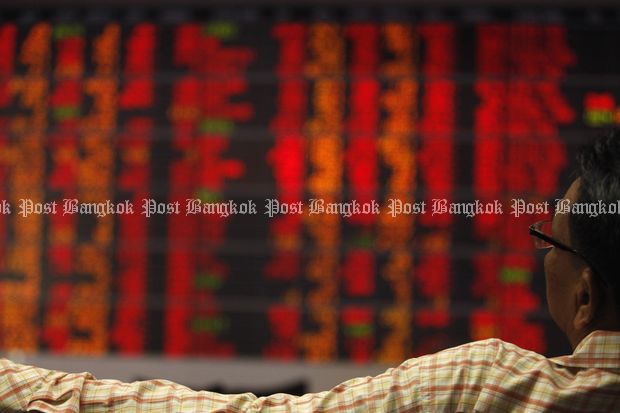
The Stock Exchange of Thailand main index tumbled 3.84%, or 52.43 points, to 1,313.18 at noon on Monday as global investors dumped shares in emerging markets.
Total trading value was 32.80 billion baht, with 9.04 billion shares changed hands.
SET50 index sank 4.24%, or 37.54 points, to 848.26 in trade worth 22.36 billion baht.
The MAI index slid 4.60%, or 26.53 points, to 549.89, in total transaction value of 1.71 billion baht.
Bloomberg reported from Wellington the global selloff in riskier assets deepened on Monday, spurring the biggest drop in Asian shares since 2011 and sending emerging-market currencies to the weakest levels on record. US 10-year yields dropped below 2%.
Commodity prices sank to a 16-year low, while credit risk in Asia increased to the highest since March 2014. The yen rallied and government bonds rose as investors sought haven assets. China’s Shanghai Composite Index tumbled 8.5%, while US equity-index futures signalled a fifth straight day of losses. The rand dropped more than 3%.
“Things are probably going to get worse before they get better,” Nader Naeimi, head of dynamic asset allocation at AMP Capital Investors Ltd. in Sydney, which oversees about $118 billion, said by phone. “You really need rate cuts and more policy easing in China. In the meantime, things can get worse. We’ve got to see more clarity around the Fed.”
More than $5 trillion has been erased from the value of global stocks since China unexpectedly devalued the yuan, fuelling speculation that the slowdown in the world’s second- largest economy may be deeper than previously thought. The rout is shaking confidence that the global economy will be strong enough to withstand higher US interest rates.
All major Asian markets were lower after US stocks capped their biggest two-day retreat in almost four years on Friday. Futures on the Standard & Poor’s 500 Index retreated as much as 3.1% after the US benchmark plunged 5.2% through the final two days of last week.
The MSCI Asia Pacific Index fell for a seventh straight day, sinking 4.3% by 12.57pm Tokyo time, set for its lowest close since June 26, 2013. The gauge is on the cusp of a 20% slide from an April high.
Hang Seng
Greater China equities plunged, with Taiwan’s benchmark gauge dropping the most since 1990 and the Shanghai Composite falling as much as 8.5%, close to the biggest intraday retreat since 2007.
Hong Kong’s Hang Seng Index fell further into a bear market. The measure is about 25% below an April high, with a gauge of price momentum falling to the lowest since the October 1987 stock-market crash.
The biggest five-day retreat for Japanese equities since the aftermath of the March 2011 earthquake, tsunami and nuclear disaster, saw the Topix index close morning trading more than 10% below its recent peak. All 33 industry groups on the Topix dropped by at least 1.9% Monday.
South Korea’s Kospi index slid 2.9%, dragged lower by Samsung Electronics Co, which plunged as much as 6.2%, the biggest drop since June 2013. Technology companies were the second-biggest drag on the Asia-Pacific gauge Monday.
Yen, euro
The yen advanced with the euro as Treasuries rallied amid speculation the global sell-off will forestall the Federal Reserve’s first interest-rate increase since 2006. US notes due in a decade paid as little as 1.99%, the lowest since April 29.
The Bloomberg Dollar Spot Index, which tracks the US currency against 10 of its most-traded peers, fell 0.2%. The yen jumped 0.8% to 121.07 per dollar, the strongest since July 9. The euro advanced 0.6% to $1.1452.
Gold was little changed at $1,159.30 after capping its biggest weekly advance since January.
Nasdaq 100 Index futures plunged 3.8%, while contracts on the Dow Jones Industrial Average retreated as much as 3.1%.
Before last week, US stocks had held their ground throughout 2015. The S&P 500 had stayed within a range roughly tracking its 50-, 100- and 200-day moving averages, boosted by signs the US economy is recovering and support from central banks. The benchmark index hadn’t had a decline of more than 5% all year.
Commodities retreat
The Bloomberg Commodity Index fell 1.4%, heading for the lowest closing level since 1999. Brent crude slipped below $45 a barrel for the first time since March 2009, while a barrel of US crude traded at $39.48. Copper lost 2.5%.
The rand plunged 3.5% to lead commodity-producing nation currencies lower. The Australian dollar dropped 1.2% and New Zealand’s currency weakened 1.4%.
Malaysia’s ringgit slid 1.5% to a fresh 17-year low, while Turkey’s lira retreated 1.8%.
|
Top 5 most active stocks |
|||
|
|
Close |
Change |
|
|
baht |
% |
||
|
PTT |
250.00 |
-15.00 |
-5.66 |
|
SCC |
480.00 |
-28.00 |
-5.51 |
|
KBANK |
166.50 |
-6.00 |
-3.48 |
|
JAS |
5.10 |
-0.10 |
-1.92 |
|
AOT |
259.00 |
-6.00 |
-2.26 |
